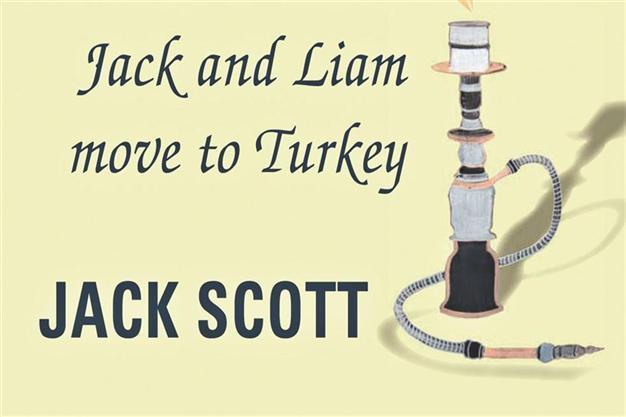Book by gay couple provides new view on same-sex marriage in Turkey
Hugh POPE

‘Perking the Pansies: Jack and Liam move to Turkey’ is the story of one of the first overtly gay married couples to set up house and home in Turkey.
Turkey is stuck between East and West, which is why I like living in Istanbul. It’s also why I get frustrated each time I see the headline “Where is Turkey going?” as if the country was about to run off somewhere. So it was fun to read a book that included both a fundamental challenge to Turkey’s status quo and accepted the country as it is. More surprisingly, “Perking the Pansies: Jack and Liam move to Turkey” is also the story of one of the first overtly gay married couples to set up house and home here.Moving to Bodrum
To be precise, Jack Scott and his spouse moved to the Bodrum peninsula, a hedonistic enclave on the Aegean coast that some Turks barely think of as really being Turkey, or at least where some Turks go in order to escape from the rest of Turkey. It’s hard to imagine their openly homosexual household lasting long in many other places in the country. But they managed, for a year or two anyway. Their experience makes for a compelling and enjoyable read, if you’re broad-minded enough for some in-your-face emotion and choppy BBC sitcom dialogue. Scott is always empathetic, respectful to the country and people that became his host and pretty acute about Turkey’s politics, society and foibles.
It was nice to see someone else agree, for instance, that “there are more parallels between Britain and Turkey than many realize … anchored to the edge of Europe but chained to it economically.” Living in the Turkish provinces opens his eyes to something those trapped in the bubbles of Istanbul high life or Ankara government rarely see: “How could Turkey ever hope to become an industrial powerhouse if they couldn’t keep the bloody lights on?”
Despite limited Turkish, his insights are sharp: “Turkish arguments are different: loud, passionate, sometimes physical and ultimately pointless. No one gives in, no one wins and no one loses.” And he has a great answer to that most difficult question: what’s Turkey like? “Amazing. Educational. Terrible. Surreal. All four.”
Scott is amusingly merciless in his dissection of British expatriates – one category is the VOMITs, well-off, middle-aged nymphs who become “Victims Of Men In Turkey,” including a VOMIT subgroup of MADs, those who have persuaded themselves that “My Ahmet is Different.” But such diversions were not enough to keep the couple interested in staying for long. Any frictions over their open gayness seem not to have been the main reason for leaving Turkey, but a bigger, less-defined disorientation and missing of home, a realization that without family, language and roots, “our life in Turkey wasn’t real. Not really. We were drifting around in an extraordinary expat bubble with people we didn’t know or really care about.”
The gay angle on Turkey was of particular interest to me. My first visit to Turkey was with a fellow student at Oxford, the remarkable, warm, generous French polyglot Pierre Thieck, who died of AIDS in 1990. This brilliant Arabist also introduced me to his Middle East of addictive homosexual encounters, often several times a day. But his Turkish and Syrian counterparts would rarely have viewed themselves as homosexual, and, paradoxically, I was always astonished at how normal and even socially acceptable Jean-Pierre’s extraordinary behavior was considered. As in Europe, Middle Eastern societies have much more trouble with the idea of a stable, loving, explicitly homosexual marriage.
Model was ‘making a real difference’
Scott and his spouse bravely hoped that their pioneering model was “making a real difference.” It was difficult for them, especially when one of their Turkish homosexual friends in Bodrum was murdered. Scott points out how hard it was to understand repressed, contradictory attitudes in a country “where sexual ambiguity is an art form … my gaydar [gay radar] malfunctioned as soon as I entered Turkish airspace … I was left in a continuous state of disarray, thrown by the intensive penetrating stares and contradictory playful signals from the swarthy men around me. I never played the game because I never got the rules.” In his epilogue, Scott suggests that “a respect for difference won’t destroy” the many old-fashioned qualities of Turkey, and a parting message: “It’s okay to be queer. It won’t bring down the house, though it might bring in a little more style.”
Hugh Pope is the author of “Dining with al-Qaeda,” “Sons of the Conquerors” and “Turkey Unveiled.” After 25 years in Turkey, Scott would probably define himself as part “emiköy” (the village type of expatriate with chickens) and part “vetpat.”
















